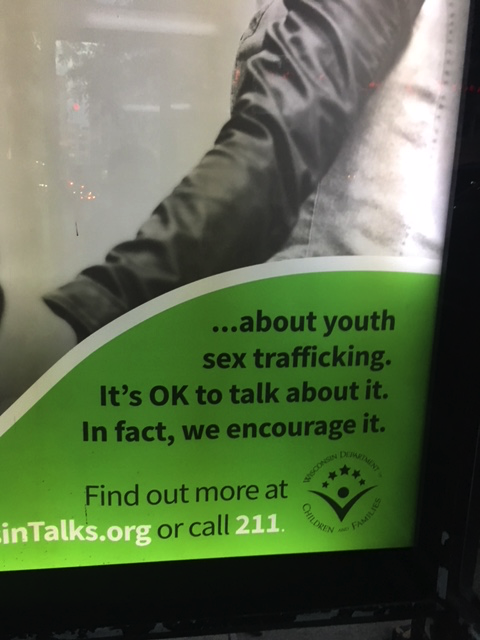Pronoun reference is hard
But you'd expect someone in the advertising business to be more aware. Reader RR spotted this unfortunately ambiguous sign in a bus shelter in Milwaukee:

But you'd expect someone in the advertising business to be more aware. Reader RR spotted this unfortunately ambiguous sign in a bus shelter in Milwaukee:

Tangshan, in Hebei Province, was the epicenter of what is considered to the deadliest earthquake of the 20th century, with more than 650,000 of its million inhabitants perishing as a result of this July 28, 1976 disaster. I still remember clearly the day that it happened, because the news came when I was attending a conference on Chinese philosophy at Harvard University, and many of the participants volunteered to assist the people of Tangshan one way or another (our offers were spurned by the Chinese government).
Two days ago, a linguistic upheaval jolted Tangshan, and the tremors were felt throughout the whole of China.
Read the rest of this entry »
Photo taken by Bathrobe at a Teppanyaki restaurant (currently undergoing renovation) in Qinhuangdao (a coastal port city in northeastern Hebei province):
Read the rest of this entry »
I'm now at the Station Biologique de Roscoff for the Ecole thématique Big Data & Speech. On the bus from Morlaix to Roscoff, there were several copies of this sign:

However, the bus had no seatbelts installed.
Read the rest of this entry »
Many times over the years we've noted cases where piled-up modals and negations leave writers (and readers) uncertain about whether a sentence might not turn out to mean the opposite of what it was meant to. Here's another example, contributed by GD — John Albrecht, "One year on", 12/31/2017:
At about this time one year ago “the penny dropped” for me as an auctioneer and I could no longer deny that auctioneers who dealt in ivory were not significantly contributing to maintaining value in this material and consequently, the ongoing slaughter of endangered species.
In this case, the tally seems clearly to come out wrong — to convince yourself, try replacing "deny" with "maintain the view", or replacing "were not significantly contributing" with "were significantly contributing".
Read the rest of this entry »
When I was teaching in Taiwan in 1970-72, there was a well-known brand of toothpaste called Hēirén yágāo 黑人牙膏 ("Darkie Tooth Paste"). Not only was the name strange, the packaging featured an image of what looked for all the world like Al Jolson in one of his blackface performances. Naturally, I was scandalized by this, but when I asked my Taiwanese friends about it, they didn't see anything wrong with the name and said that it made sense from an advertising standpoint because the man had gleaming white teeth and the blackness of his skin made them seem all the brighter.
Read the rest of this entry »
Recently there was quite a ruckus over the correct word to be used for "maternal grandmother" in second-graders' textbooks in Shanghai:
"Much Ado About Grandma: Textbook Change Sparks Linguistic Debate: Critics call ‘waipo’ to ‘laolao’ change ‘cultural hegemony’ from the north", Kenrick Davis, Sixth Tone (6/22/18)
"A debate over the word for ‘grandmother’ in China exposes a linguistic and political rift", Echo Huang and Ziyi Tang, Quartz (6/26/18)
The big controversy was over whether students should be taught to say "lǎolao 姥姥" or "wàipó 外婆", both of which mean "maternal grandmother".
Read the rest of this entry »
In Sunday's post "Ask Language Log: Prosodic hyphens and italics", I noted that one of the features that Grant Allen's 1899 novel identifies as typically American — or at least typical of the one American who is caricatured in chapter 3 — is the socially inappropriate use of "miss" as a term of address:
'Good morning, miss,' he began–he called me 'Miss' every time he addressed me, as though he took me for a barmaid.
At first I found this as weird as the observation about the same American individual that "Like all his countrymen, he laid most stress on unaccented syllables."
But a little research and introspection have supported some aspects of Grant Allen's sociolinguistic intuitions, while leaving some other questions open.
Read the rest of this entry »
Dan Waugh sent in the following photograph, which he had received from a colleague, who in turn had received it from another colleague who was wondering what is written on the tapestry (what they are referring to it as):
Read the rest of this entry »
Modern Standard Mandarin (MSM), the official language of the People's Republic of China, is designated in four different ways, depending upon the country in which these terms are used:
Guóyǔ 国语 / 國語 ("National Language") — Taiwan / ROC
Huáyǔ 华语 / 華語 ("Florescent / 'Chinese' Language") — Singapore
Hànyǔ 汉语 / 漢語 ("Sinitic Language") — linguists
Pǔtōnghuà 普通话 / 普通話 ("Common Language") — China / PRC
Although these four designations convey distinct, yet subtle, nuances, linguistically they basically refer to the same language with only minor variations.
Read the rest of this entry »
Singapore has four official languages: Malay (de jure national language), English (de facto main language), Mandarin, and Tamil. There are also a number of other languages that are spoken by significant numbers of the population, e.g., Hokkien-Taiwanese, Cantonese, Teochew, Hainanese, Hakka, Fuzhou (Hokchia, Hokchew), Pu-Xian Min (Henghua), and Shanghainese (Wu). But the most commonly spoken Singaporean tongue of all is a creole, Singlish, that isn't even listed in the census. Now, as described in this article, the government of Singapore has launched a campaign to eradicate Singlish from the island republic's linguascape:
"The Government Campaign to Get Rid of Singapore’s Unofficial Language: Singlish, a creole, is spoken all over the country, but politicians want citizens to 'speak good English'", Atlas Obscura (June 26, 2018).
Read the rest of this entry »